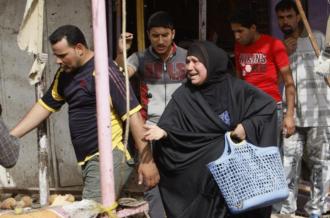Tribal chiefs in Iraq have issued a dire warning about the country's future after the latest wave of sectarian violence.
At least 68 people have been killed and 195 injured in a series of car bombs across Iraqi cities, police and medics say, pushing the death toll over the past week to more than 200. This is one of the most sustained bouts of sectarian violence the country has seen in years.
The bloodshed is still far shy of the pace, scale and brutality of the dark days of 2006-2007, when armed groups carried out retaliatory attacks against each other in a cycle of violence that left the country awash in blood. Still, Monday's attacks, some of which hit markets and crowded bus stops during the morning rush hour, have heightened fears that the country could be turning back down the path toward civil war.
 |
| Spotlight
Follow Al Jazeera coverage of the past decade
|
Iraq's Shia majority, which was oppressed under the late dictator Saddam Hussein, now holds the levers of power in the country. Wishing to rebuild the nation rather than revert to open warfare, they have largely restrained their armed groups over the past five years or so as some Sunni armed groups such as al-Qaeda have targeted them with occasional large-scale attacks.
But the renewed violence in both Shia and Sunni areas since late last month has fuelled concerns of a return to sectarian warfare.
The worst of Monday's violence took place in Baghdad, where ten car bombs ripped through open-air markets and other areas of Shia neighbourhoods, killing at least 47 people and wounding more than 150, police officials said.
In the bloodiest attack, a parked car bomb blew up in a busy market in the northern Shia neighbourhood of Shaab, killing 14 and wounding 24, police and health officials said.
Iraqis exasperated
The surge in bloodshed has exasperated Iraqis, who have lived for years with the fear and uncertainty bred of random violence.
"How long do we have to continue living like this, with all the lies from the government?" asked 23-year-old Baghdad resident Malik Ibrahim.
"Whenever they say they have reached a solution, the bombings come back stronger than before."
 |
| Both sides have restrained their armed groups in recent years, until the past few weeks [Reuters] |
The predominantly Shia city of Basra in southern Iraq was also hit Monday, with two car bombs there - one outside a restaurant and another at the city's main bus station - killing at least 13 and wounded 40, according to the provincial police spokesperson.
In the town of Balad, about 80km north of Baghdad, a car bomb exploded next to a bus carrying Iranian pilgrims, killing six Iranians and one Iraq and wounding nine people, a police officer said.
There was no immediate claim of responsibility for the attacks, but the fact that they all occurred in Shia areas raised the suspicion that Sunni militants were involved. Also, Sunni fighters, particularly al-Qaeda in Iraq, are known to employ such large-scale bombings bear.
Monday's violence also struck Sunni areas, hitting the city of Samarra north of Baghdad and the western province of Anbar, a Sunni stronghold and the birthplace of the protest movement.
A parked car bomb in Samarra went off near a gathering of pro-government Sunni armed groups who were waiting outside a military base to receive salaries, killing three and wounding 13, while in Anbar armed men ambushed two police patrols near the town of Haditha, killing eight police officers, police and army officials said.
Also in Anbar, authorities found 13 dead bodies in a remote desert area, officials said. The bodies, which included eight police officers who were kidnapped by armed men on Friday, had been killed with a gunshot to the head.
The officials spoke on condition of anonymity because they were not authorised to talk to the media.


Post a Comment